Nirbhaya 10 years on: The lives the Delhi gang rape changed
 Getty Images
Getty ImagesTen years ago this month, a horrific gang rape and murder in Delhi was a watershed moment which focused India's national conversation on an issue previously left in the shadows - violence against women.
This report contains content which some readers may find upsetting, including sexual violence
When 23-year-old Jyoti Singh was gang-raped by the driver of the Delhi bus she was travelling on, and five accomplices, the incident shocked the world. Jyoti, given the moniker "Nirbhaya" or the "fearless one" by the media, had fought back. But she suffered internal injuries and was thrown naked from the bus. She died within two weeks of the attack.
The nation's shock soon gave way to anger. Hundreds of young women and men in Delhi demanded justice, marching in the biting cold and braving water cannons and tear gas used by the police to dispel the seething crowds.
Fear is my own first memory of that attack. I remember the dread that crept up my body as I read horrific reports of her torture - a rod being inserted into her and her intestines pulled out. I considered myself pretty battle-hardened, having grown up with frequent street harassment in Delhi, but this terrified me.
The 2012 protests did bring about a certain amount of change - laws were amended to recognise wider and more nuanced definitions of violence against women, set penalties for inefficient police action, and create stricter punishments for perpetrators - including, significantly, the death penalty.
But a decade later, there are still significant dangers for women in India. The crime rate against women has increased by over 50% in the past decade.
One woman who found herself pulled into battles for justice against rape is the mother of Jyoti Singh - Asha Devi.
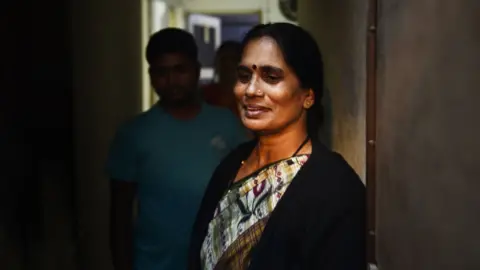 Getty Images
Getty ImagesHer experience inspired her to set up the Nirbhaya Jyoti Trust in memory of her daughter. Indian law requires anonymity for rape victims and their families, but Asha decided to make her daughter's name public in 2015, saying "those who commit heinous crimes should be ashamed, not the families of victims".
Asha has not just campaigned for justice for her daughter, but has also proved to be a significant emotional and practical resource for others whose lives have been wrecked by misogynistic violence. Over the years, many people have sought Asha out.
"Sometimes all they need is hope, to carry on," she told me at her small flat in Delhi. "At other times the complex judicial process feels daunting, so I share what I have learnt and guide them to legal aid."
I have tracked down and spoken to just a handful of the many people whose lives have been intertwined with her own.
One is Seema Kushwaha, a student at the time of Jyoti's death, who joined the Delhi protests with her friends in the wake of the attack. Unlike half of her 20 flatmates, whose worried families then persuaded them to return to their family homes, she remained in the city, and continued with her studies.
 Getty Images
Getty ImagesShe was studying law and started going to the court hearings in Jyoti's case - she felt she needed to show support to Jyoti's family in their quest for justice. Seema eventually joined the legal team that secured the enactment, in 2020, of the 2013 death penalty verdict for the attackers.
When it was confirmed at a last-minute Supreme Court hearing that the men would be hanged, Seema ran straight to Asha's house and knelt before Jyoti's picture, telling her she had delivered on her promise - before breaking down in tears of relief and grief.
"The whole country was watching, and it was important that the rapists be executed," she says.
The decision to bring the death penalty for heinous cases of rape and gang rape in 2013 was in part a populist measure by the government, as protests had grown across the country, fuelled by the myth that rape was mostly committed by strangers who were illiterate, poor or unemployed.
All six men charged with Nirbhaya's gang rape and murder fit that profile - but the statistics show that strangers don't pose the greatest danger.
The Indian government's crime data has consistently shown that in more than 95% of all rape cases, the attackers are known to the victims - they are relatives, friends, neighbours and co-workers.
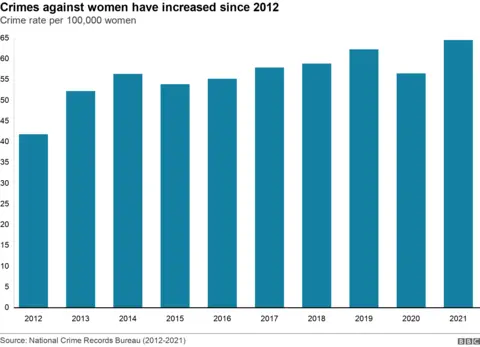
One of those whose family was devastated by such an attack is Pankaj (not his real name), whose 13-year-old sister was raped and murdered on a farm near their home.
It was Pankaj who found her body. The young girl's blood-soaked tunic was torn, she had been knifed repeatedly, and a bamboo stick had been pierced through her neck.
The attack on Pankaj's sister took place the summer before Jyoti was raped and was just as brutal. He felt it was important I see the extent of the violence, so he showed me pictures taken after the attack. Pictures I will never forget.
It happened in a remote village in one of eastern India's poorest states, far from the capital, and was only reported in local newspapers.
"Her story never came out, there was no outrage, no calls for justice," Pankaj told me as I sat down with him in his small mud house. "All I felt was fear of the men who could be so inhumane."
Fear followed by shock. Unlike Jyoti, who was attacked by strangers, all of the four people arrested over his sister's case were known to her, including a neighbour and a teacher who gave her tuition after school.
"When the police arrested the teacher, I thought they had made a mistake, because a 'guru' has a very sacred relationship with their disciple," Pankaj told me.
"Only when he admitted to the crime and helped recover the knife used in the attack, did I believe it."
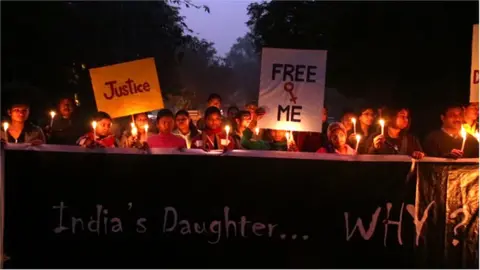
The men were convicted and awarded the death penalty by a lower court in 2016. But upon their appeal, the High Court acquitted them in 2021, saying that even though the offence was gruesome, the prosecution had "miserably failed" to provide evidence against the accused. All four later denied the crime, including the teacher.
Improper collection of evidence and recording of testimonies by police officials have been the reason for acquittals in many rape cases, including one last month, leaving victim's families to risk running into the accused.
This was the case with Pankaj.
"They came to the village market and threatened me with murder for ruining their lives," he told me.
Still he did not give up. Armed only with a newspaper cutting, he headed to Delhi in a desperate attempt to get justice for his sister. And that newspaper article he had so carefully kept was about Asha Devi.
For Pankaj, meeting Asha opened an important door. A senior lawyer who fought Jyoti's case is now appealing against the High Court acquittal of his sister's killers.
"I know I will again get the death penalty. I have faith in the justice system," Pankaj says.
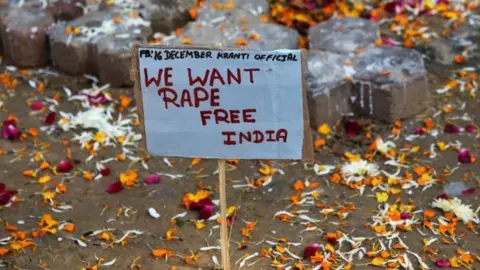 Getty Images
Getty ImagesThe Indian justice system may be overloaded and slow but it still works better for rape cases as they get media attention, public sympathy and calls for accountability. What gets much less coverage is the violence inside homes, and yet this is epidemic in proportion.
Domestic violence is the leading crime against women in India, with four times more reported cases than rape.
For 45-year-old Sneha Jawale, the silence around this has been deafening.
She is one of the women featured on the BBC 100 Women list which, annually for the past 10 years, has named 100 inspiring and influential women from around the world.
Sneha told BBC 100 Women that her husband had often beaten her to demand more dowry, but on 24 December 2000 events took a devastating turn.
"One night, in a fit of rage, he threw kerosene, lit a matchstick and burned my face, chest and arms," she recounts. She was set alight, in front of their young son.
While recovering in hospital, Sneha told her family that her husband was the one who had attacked her. But he was influential, a "big shot", and they didn't report him to the police. Instead, she says they told Sneha's extended family that she had died.
This was shocking even for me, a journalist who had heard many stories of women battling domestic violence. How could parents abandon their daughters at their most vulnerable?
The violence Sneha endured was kept hidden behind the four walls of her house. But the attack on Nirbhaya, 12 years later, changed that.
In 2013, Sneha was invited to be in a play, named after Nirbhaya and based on real testimonies of survivors, which aimed to break the silence around violence against women.
For the next four years, Sneha shared her story with audiences around the world - the only member of the cast who was not a professional actor.
"The play taught me many things. It changed me," Sneha says.
"After our performance, many people in the audience would come and share their own stories. It helped me overcome my trauma. I no longer felt alone."
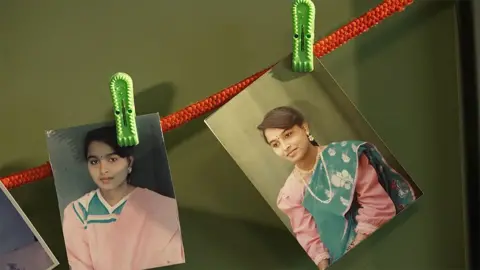
This loneliness in the journey of overcoming trauma, seeking help, and battling for justice was a recurring theme in my conversations.
Barkha Bajaj started a crisis line for women in distress. A trained psychologist and mental health practitioner, Barkha had already worked in the US with survivors of sexual abuse - but the Nirbhaya case was a turning point in her life.
In late 2012 she was travelling alone by train in north-east India, with no other women in her compartment. The details of Jyoti's attack were playing on her mind and fear started to take hold. She decided to sleep with her shoes on and with red chilli powder handy. It struck her that if she were in trouble, there was no helpline at that time that she could call.
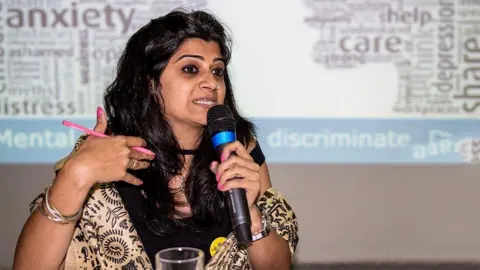
"That realisation channelled all my fear into something productive," she told me over a video chat from Pune. "Nothing could stop me."
Although the helpline was set up in response to a rape by strangers, for the last nine years she has spent most of her time answering calls from women trying to escape violence at home.
"What we need is a much better state infrastructure to support women when they step out of abusive marriages, and affordable legal counsel for when they decide to take on court battles," Barkha says.
It is this sense of the wider, systemic battles to be fought, that is the reason that Seema has now turned to politics.
Earlier this year Seema joined the Bahujan Samaj Party, which fights for the rights of Dalits, a community on the lowest rung of a deeply discriminatory Hindu caste system.
A Dalit herself, Seema is a crusader for justice, especially gender justice, and believes in fighting for equal rights for her community. She hopes that as a politician she can be more effective in implementing both caste and gender equality.
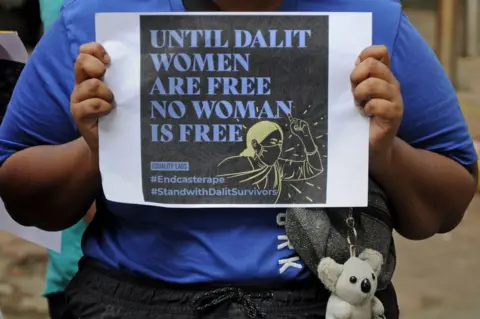 Getty Images
Getty Images"Sexual violence is one issue, but inequality in society pervades our families, marriage structures, politics - it all needs to change," she says.
Nirbhaya's mother, Asha Devi agrees that a seismic shift for women's safety is extremely difficult to bring about.
"We thought we would change things for other girls, but we could do nothing," she says.
She doesn't have a high view of the police and government-appointed lawyers, and the judicial process is complex, with information hard to come by. Navigating her way through it has taught her a lot.
"I am not educated, but I am a fighter and I had promised justice to my daughter," she says.
"It is traumatising to hear of others' pain, but it also gives me peace to be there for them in their long, lonely battle for justice - just as some stood by me in mine."


BBC 100 Women names 100 inspiring and influential women around the world every year. Now in its tenth year, it was started in response to the 2012 Delhi gang rape, to improve coverage of women's stories in the media.
